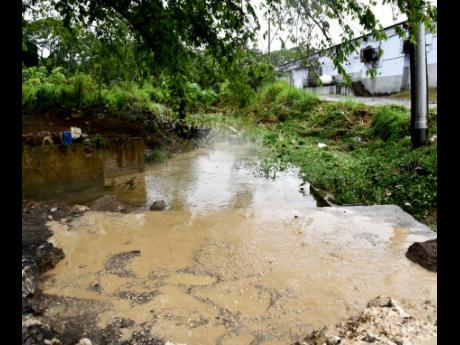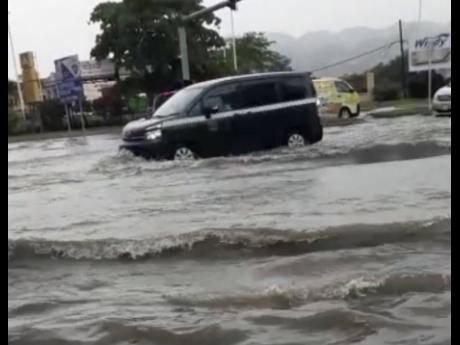Deadly deluge
Engineer points to weak infrastructure as NWA defends MoBay’s anti-flooding design
The National Works Agency (NWA) has rejected claims that poorly designed stormwater drains and a haphazard approach to approving development projects are to blame for the Second City’s perennial flooding crisis, which last week resulted in the tragic death of a schoolgirl, whose grandmother is yet to be found after also being washed away.
Last Tuesday, heavy afternoon showers resulted in flooding of sections of Westgate and the Fairview commercial district in the tourist town, which caused the death of 12-year-old Jennel Walters, who was travelling with family members, when their car was swept away by the floodwaters. Two members of the family were rescued, while Jennel and her grandmother, 68-year-old Beryl Walters, were taken downstream by the murky waters. The senior Walters has also been feared dead.
While the NWA, which has responsibility to ensure the development of safe and reliable infrastructure, including major road and drainage networks, has blamed the recent spate of flooding on improperly disposed solid waste and an unusual volume of water from the downpour, civil engineer Kerry Thomas is forecasting that more tragedies could unfold if existing infrastructural deficiencies across the wider parish of St James are not corrected.
“Tuesday’s incident was due to happen all along and worse will happen if immediate action is not taken,” said Thomas, who has served as project manager for several major development initiatives in the western region.
“Nature has served us with sufficient warnings and St James will continue flooding until we take a serious look at correcting this problem, but the priority must be to improve our drainage system,” he told The Sunday Gleaner.
Thomas faulted the NWA for not ensuring that a proper drainage improvement system accompanied projects like a development in Friendship, which he said could pose a problem for nearby communities as the incidents of flooding increase.
“It is all well and good to say that we are building a lot of houses, but we must also determine where the water goes,” he said. “Massive developments with no drainage improvement is a recipe for disaster, because you are going to have far more surface water and less permeation into the ground and that is now manifesting itself in our city.”
Increased development
But while acknowledging that increased development will result in added pressure on the drainage system, the community relations officer for the NWA’s western region, Janel Ricketts, stoutly defended the work of the agency in the tourist town.
“We had significant flooding because of the sheer volume of rain, but if you notice after the flooding, the water receded pretty quickly because our drains were clear,” she said. “Poor garbage collection policies and practices do cause a challenge on the drainage network, but we have done our evaluation and our drainage system is properly maintained.”
Acting Montego Bay Mayor Richard Vernon did not respond to questions from The Sunday Gleaner, but Thomas, who is also the local representative for the Mount Salem Division, says that central government usually has the final say.
“If you look at the corporation, I believe we behave a little weak at times and we need to have more teeth,” he said. “When it comes to policy decisions, we can push from the local level, but some things go straight back to the central government and NWA.”
The Government has allocated a total of $5 billion for roadworks during the 2022-23 fiscal year. Some $300 million is earmarked for emergency work resulting from flooding, $84 million programmed for gullies, $54 million for bridges, and $74 million set aside to address issues relating to traffic signals.
But Thomas said that correcting the problem will demand the level of financing that is not at the St James Municipal Corporation’s disposal.
“Like everything else, you eat an elephant one bite at a time, but the most important thing is to start the process, look at correcting the problems at the lower level, because that is where everything backs up … then dealing with the issues in the higher terrain,” he suggested.
The civil engineer does not believe the current infrastructure in the Westgate area has the capacity for the volume of water that comes from that community during heavy rainfall, and an upgrade of the Barnett River to Tucker Road drainage system should be of critical importance.
Heavy rainfall periodically triggers severe flooding in sections of St James, causing millions of dollars worth of extensive damage and losses to businesses, households, farmers and motorists as well as the road network.
Last week, businesses were spared serious impact.
“The majority of our businesses were not affected,” said Janet Silvera, president of the Montego Bay Chamber of Commerce and Industry. “It had to do mainly with their staff not getting home until near midnight on Tuesday and my understanding is that several tour operators saw their guests missing their flights.”
Drainage issues
She said that drainage issues affected one of the city’s leading department stores in the Fairview area.
“But of concern to us as a chamber is the fact that after two days of rain, we were flooded the way we were,” said Silvera. “I implore the powers that be to bring in some engineers to see how best we can stop this increase in incidents of flooding.”
She said the indiscipline of some vendors and business operators in downtown Montego Bay was also of concern as they do not dispose of their garbage properly, adding that a public education programme is imperative.
“Talks on the environment are not sexy, but unless we get our people to understand the significant role they play in destroying our environment, they will not take the issue seriously,” she told The Sunday Gleaner.
In February, Professor Michael Taylor, dean of the Faculty of Science and Technology and co-director of the Climate Studies Group, Mona, at The University of the West Indies, stated that the emergence of a new climate normal demands a redesign of drains and waterways to accommodate more water, and reconsider our development pursuits in environmentally sensitive areas.
“Truthfully, climate will not give us a break in the near future, according to the science we do. If it is not intense flooding, it will be long-term drought, or an intense near-pass hurricane, or hot extremes, or beach loss due to sea-level rise, or the acidification of our oceans and loss of coral content. We will always be recovering from one or more of these events at the same time,” he said.
“Climate change is making a mockery of ill-conceived, economics-only driven activities not premised on sustainability principles,” added Taylor. “It magnifies their downstream consequences that were never contemplated.”
Last November, Prime Minister Andrew Holness said that funds have been earmarked to improve the drainage in Montego Bay, particularly in the North Gully area.
“The Government is already down that road because we have made allocations in the Montego Bay Perimeter Road Project to undertake the studies for a proper drainage system for St James. So, the funding is in place for that and the work for that should start and, indeed, that would be the first step towards truly addressing this problem,” he told Parliament.


